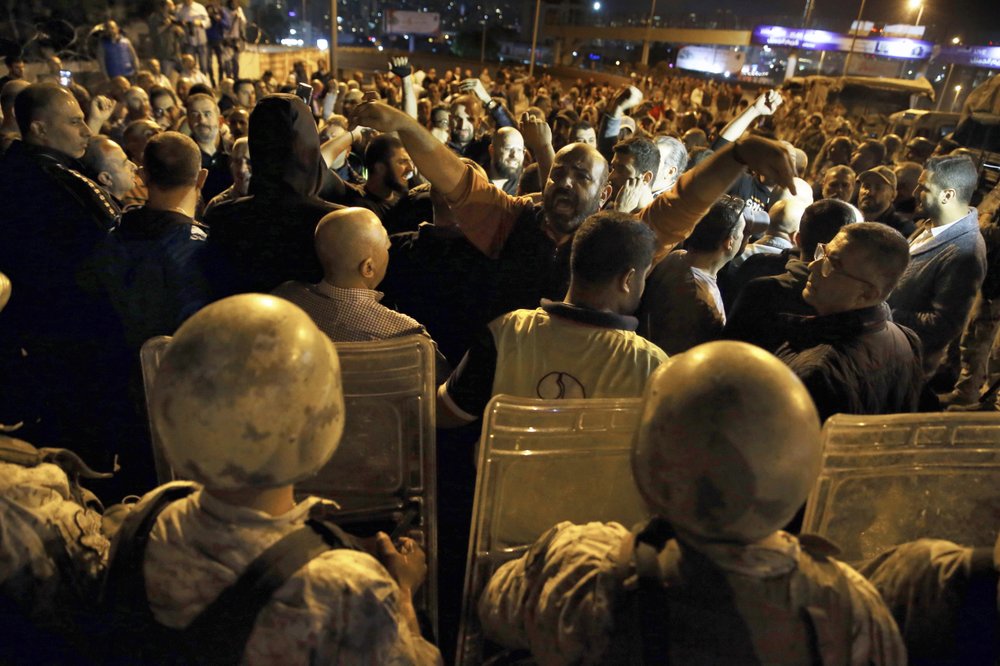
BEIRUT (AP) — Dozens of people were injured in overnight confrontations between supporters and opponents of Lebanon’s president, most of them in fistfights and stone throwing that erupted in cities and towns across the country, the Lebanese Red Cross said on Wednesday.
The nationwide uprising against the country’s ruling elite has remained overwhelmingly peaceful since it began on Oct. 17. But as the political deadlock for forming a new government drags on, tempers are rising. President Michel Aoun has yet to hold consultations with parliamentary blocs on choosing a new prime minister after the government resigned a month ago.
Outgoing Prime Minister Saad Hariri, who was Aoun’s and Hezbollah’s favorite candidate to lead a new Cabinet, withdrew his candidacy for the premiership, saying he hoped to clear the way for a solution to the political impasse after over 40 days of protests. Protesters have resorted to road closures and other tactics in an effort to pressure politicians into responding to their demands for a new government.
The prolonged deadlock is awakening sectarian and political rivalries, with scuffles breaking out in areas that were deadly frontlines during the country’s 1975-90 civil war. The violence first began on Sunday night after supporters of the main two Shia groups, the militant Hezbollah and Amal Movement of Parliament Speaker Nabih Berri, attacked protesters on Beirut’s Ring Road. That thoroughfare had in the past connected predominantly Muslim neighborhoods in the city’s west with Christian areas in the east.
Some of the most intense clashes occurred Tuesday night between the Shia suburb of Chiyah and the adjacent Christian area of Ein Rummaneh, where stones were hurled between supporters of Hezbollah and rival groups supporting the right-wing Christian Lebanese Forces. A shooting in Ein Rummaneh in April 1975 triggered the 15-year civil war that killed nearly 150,000 people.
Also on Tuesday night, supporters and opponents of Aoun engaged in fistfights and stone throwing in the northern city of Tripoli, Lebanon’s second largest, injuring 24 people; seven were taken to the hospital.
In the mountain town of Bikfaya, 10 people were injured including five who were hospitalized after scuffles and stone throwing between Aoun’s supports and supporters of the right-wing Christian Lebanese Phalange Party, according to the Red Cross paramedic group. The violence broke out after a convoy of dozens of vehicles carrying Aoun supporters drove into the town, which has been historically a Phalange stronghold.
“What happened yesterday was a mobile strife that intentionally tried to provoke our people,” said Phalange leader, legislator Samy Gemayel. “We warn our people that there are attempts to attack their revolution, which should remain peaceful.”
Hezbollah and Amal supporters also attacked protesters in the northeastern city of Baalbek and the southern port city of Tyre.
Police and troops deployed in the areas of clashes and got the situation under control hours after the violence broke out.
Hariri had resigned on Oct. 29 in response to the mass protests ignited by new taxes and a severe financial crisis. His resignation met a key demand of the protesters but plunged the country into uncertainty, with no clear path to resolving its economic and political problems.
Hariri had insisted on heading a government of technocrats, while his opponents, including Hezbollah, want a Cabinet made up of both experts and politicians.
For weeks, the Lebanese security forces have taken pains to protect anti-government protesters, in stark contrast to Iraq, where police have killed more than 340 people over the past month in a bloody response to similar protests.
Reporting by Bassem Mroue
Image: Supporters of Lebanese President Michel Aoun chant slogans, as Lebanese republican guards stand guard during a protest near the presidential palace in the Beirut suburb of Baabda, Lebanon, on Tuesday, Nov. 26 (AP Photo/Bilal Hussein)



